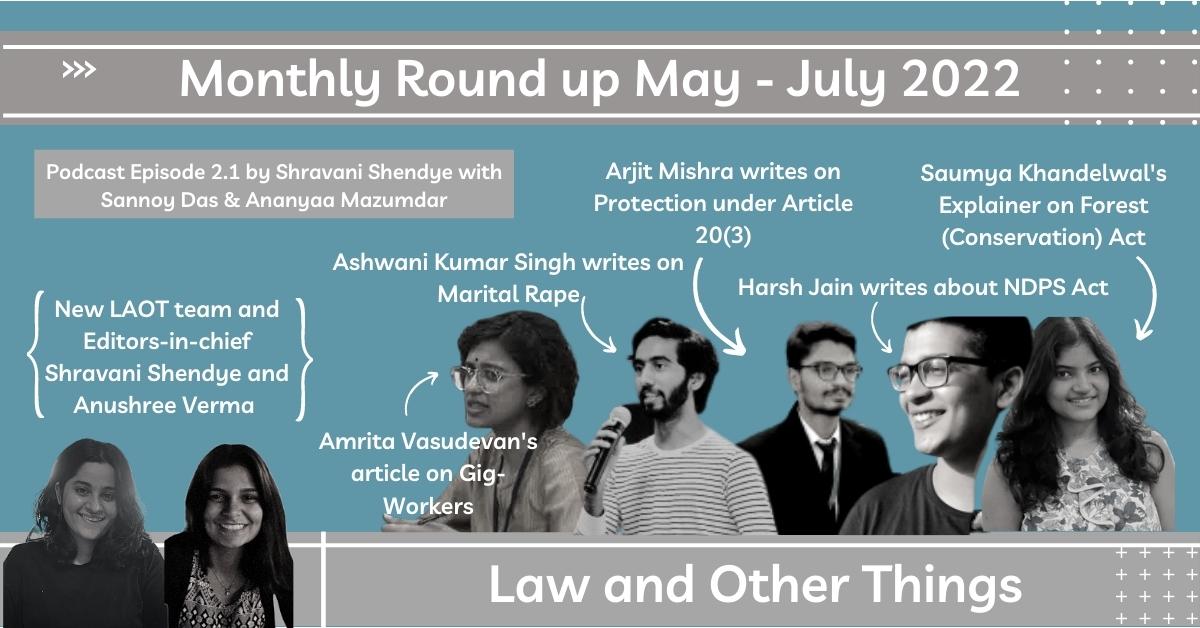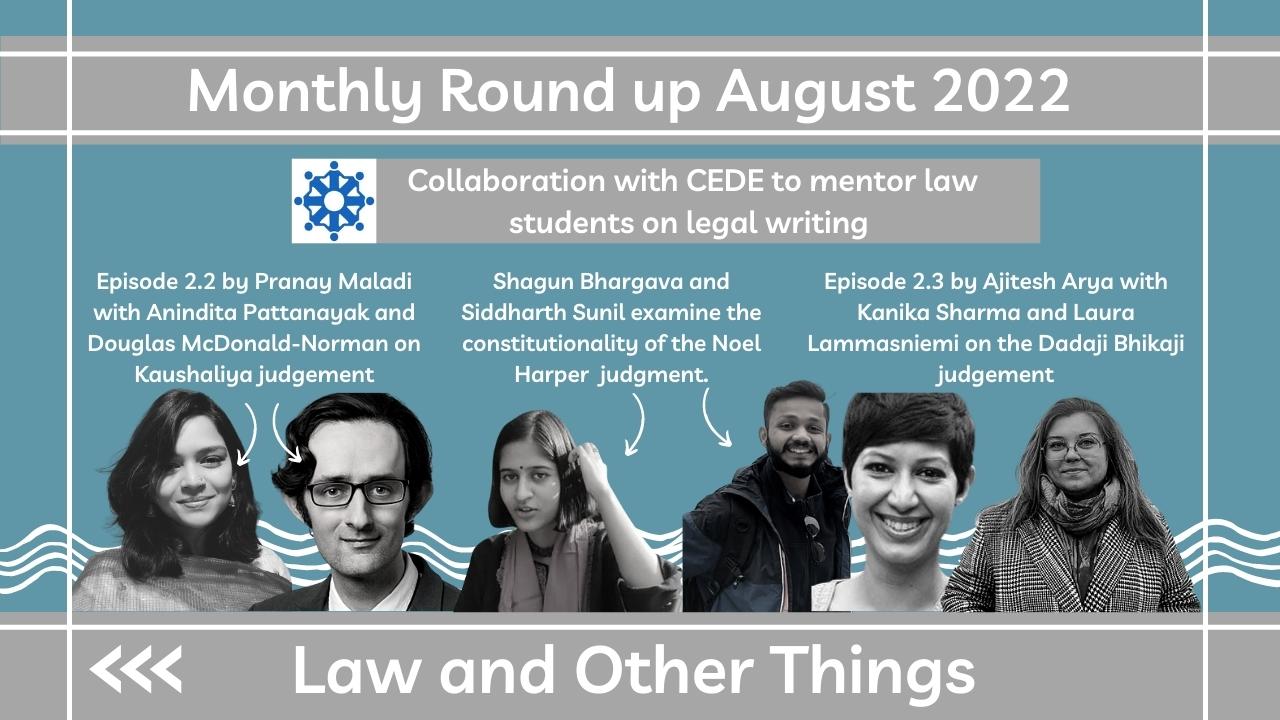The Courts and the Constitution Conference marked the close of the 2021-22 academic year for the Law and Other Things team. The conference saw six-panel discussions on various themes under constitutional law and public policy. The conference ended with a farewell to the outgoing Student Editorial Board led by Bhavisha Sharma and Gayatri Gupta.
Introducing the New Editorial Team
Taking over the reins are our new Editors-in-Chief Shravani Shendye and Anushree Verma, who will be leading the newly constituted Student Editorial Board 2022-23 comprising Ajinkyaraj Pacharaney, Dyuti Anand, Eeshan Sonak, Harsh Jain, Sukrut Khandekar and Utkarsh Mani Tripathi have been selected as the editors. Deepali Bhandari and Shanthan Reddy have joined LAOT as Senior Analysts while Goyam Pitalia, Ishika Garg, Kartik Shrivastava, and Nishka Kapoor will be serving as Associate Analysts.
Lakshya Choudhary, Himanshu Mehra, and Yashashwini Santuka have joined us as Social Media Editors, and Suhani Paruvelly and Avani Vijay as Technical Editors.
Articles & Explainers
We are pleased to bring you an update on the Blog’s activities over the months of May, June, and July, where we hosted some exciting discussions. We started off with an explainer written by our analyst Harsh Jain on the provisions of the NDPS Act that examines the provisions dealing with bail, criminal conspiracy, and confessions in the context of Aryan Khan’s case.
Next, we have Amrita Vasudevan’s article on the Gig-Worker as the Archetypal Citizen-Subject. The article argues that although the Code on Social Security, 2020 acknowledges gig and platform work, the state leans into the archetype of an entrepreneurial gig-worker, who is imagined to be young, self-motivated, and uninterested in a traditional office job. Vasudevan concludes that many of the defining features of the archetypal gig-worker are built on the affordances of a vulnerable workforce.
We published another explainer by our analyst Saumya Khandelwal on the Proposed Changes to the Forest (Conservation) Act, 1980. These proposed amendments have arisen out of ignorance towards constitutionally and legally bound procedures and made the forest dwellers’ lives difficult by bringing community-owned forest resources within its purview. Saumya concludes by saying that “No amendment should be allowed that changes the very purpose of the Act, which is to foster recognition of the forest as a common heritage and promote sustainable forest development”.
We also published Arjit Mishra’s article titled Phenolphthalein Test: An Anathema to Protection provided under Article 20(3) where Arjit argues that the prevailing practice of conducting a phenolphthalein test to catch a public servant receiving illegal gratification under the Prevention of Corruption Act, 1988 violates the right against self-incrimination. He says that “The pressure and torture faced by the public servant and his inability to contest against testifying the phenolphthalein test results in leading evidence against themself which eventually leads to the rising of the presumption against them for committing an offense and maybe, in successful prosecution”.
Lastly, we have Ashwani Kumar Singh’s article on Is Marital Rape Exception an Immunity Clause or an Ingredient of the Main Definition Clause of Section 375, IPC. The article comes against the backdrop of the Delhi High Court Bench split decision on whether or not courts have the power to make the Martial Rape Exception inapplicable. The article employs a textual analysis of provision-specific exceptions present in the Indian Penal Code, 1860 to argue that since the marital rape exception only provides immunity and does not form a part of the main definition, striking it down will not be considered an interference with the ingredients of the offense of rape and will, thus, not amount to the creation of a new offense.
It must be noted that there is already a related matter pending before the Supreme Court against a judgment of the Karnataka High Court where the High Court had refused to quash a marital rape case. The matter is expected to come up soon!
Podcast Series
LAOT launched its podcast series in April, through which we seek to bring to our listeners conversations with some great people on a wide range of topics covering law, politics, sociology and many more. The podcast is available on Anchor, Spotify, Amazon Music, Stitcher, and Google Podcasts, and transcripts will be uploaded on the LAOT website. All episodes of the Law and Other Things Podcast can be found on this page. We carried Episode 2.1 which was an Interview conducted by Shravani Shendye with Sannoy Das & Ananyaa Mazumdar on the Indian Feminist Judgments Project dealing with the rewriting of the Charan Lal Sahu case regarding the constitutionality of the Bhopal Gas Tragedy Compensation scheme.
Listicles
LAOT published two interesting listicles on Twitter, which were compiled by our editors Utkarsh Tripathi and Dyuti Anand. We covered the US Supreme Court’s overruling of Roe v. Wade, which effectively removed the legal status of the right to abortion. Further, the Supreme Court recently dismissed a challenge to the clean chit given to PM Modi for his alleged role in the 2002 Gujarat riots, following which the Gujarat Police arrested activist, Teesta Setalvad. We published a short listicle on the same.
We have many more interesting discussions coming up, including podcasts, explainers, and analytical articles.






[…] Posted byEeshan Sonak […]